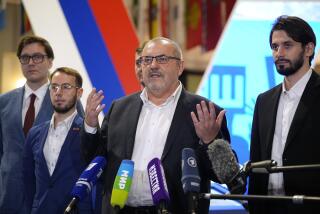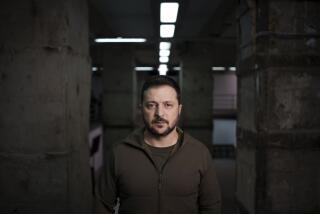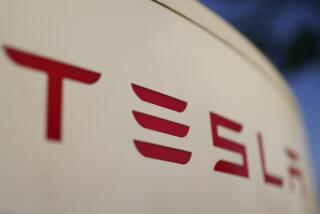Yeltsin Aims at Military-Industrial System : Soviet Union: The complex consumes a quarter of the country’s output. The candidate pledges to force it to pay its own way.
- Share via
SVERDLOVSK, Soviet Union — Boris N. Yeltsin, campaigning to become the first popularly elected president of Russia, pledged here Sunday to force the Soviet Union’s powerful military-industrial complex, which consumes a quarter of the country’s output, to pay its own way.
Yeltsin, a radical populist who has been challenged by his opponents to honor the many campaign promises he has made, then signed a decree giving the Sverdlovsk region extensive economic autonomy, freeing it both from the central government ministries and the Russian Federation that he heads.
“Sverdlovsk’s industry is one of the most militarized in the Soviet Union,” he told an election rally here, “and it is a good place to start the conversion to a new way of operation for that kind of industry.
“There will be a system now of military appropriation and equipment purchasing on a competitive basis. If the Defense Ministry refuses to let go of some highly specialized factories, like the Ural Wagon Factory (the world’s biggest tank plant), it will have to bear all the expenses without exception down to the last cent.”
As the Soviet Union plans the next stage of its economic reforms, the unchecked voraciousness of the military-industrial complex is a key issue, for it effectively prevents the country’s largest, most advanced industrial sector from moving to a market economy.
At the same time, the military-industrial complex is seen as continuing to siphon the best of everything--resources, funds, technology, talent--from the economy at a time when other sectors, particularly those supplying Soviet consumers, are on the verge of collapse.
Yeltsin, who is regarded as a certain winner on the second, if not the first, ballot for the Russian presidency, is running both as an incumbent (as chairman of the Russian Federation’s Parliament he has most of the powers that the republic’s president will have) and as an outsider, campaigning against the central government.
Questioned on Russian Television later Sunday in a “meet the candidate program,” Yeltsin said the biggest political mistake of his career had been leaving Sverdlovsk, where he had been the Communist Party leader, for the Soviet capital. He said his second-biggest mistake was becoming a minister in the central government and the third-biggest was going into the new Soviet Parliament.
In running for president of the Russian Federation, he is breaking free of all this, Yeltsin implied, and coming back to the people. The hourlong television interview was one of his most effective campaign appearances and came virtually on the eve of the election Wednesday.
To win, Yeltsin needs at least 50% of the votes cast; if he does not poll that much, he will face a runoff against the second-ranked candidate, probably former Prime Minister Nikolai I. Ryzhkov or former Interior Minister Vadim V. Bakatin.
Yeltsin, 60, who had earlier said that he would retire and tend to his garden if defeated, took a different tack Sunday, making plain his intention to remain on the political scene. “Gardening was a joke,” he explained.
In Sverdlovsk, Yeltsin was offering a way for Russia, the largest and richest of the Soviet republics, to extricate itself from the country’s deepening economic crisis by making the central government pay the real costs of production of military equipment and allowing the plants to operate under local management and slide out from Defense Ministry control.
“Those transient rulers in the center never gave a thought to Russia,” Yeltsin told the rally, which was broadcast on local television and radio and on loudspeakers throughout the city. “All they were concerned about was how to carve the biggest and juiciest piece for themselves out of it.”
Through tough negotiations with the central government, Yeltsin continued, Russia keeps two-thirds of the 75 billion rubles, about $150 billion at the official exchange rate, that it formerly paid to Moscow.
In another Yeltsin initiative, some major Sverdlovsk enterprises, including the giant machine tool company Uralmash, the city’s principal steel mill and the world’s largest titanium producer, are going “republican,” using a policy of decentralization to move from the control by central government ministries to the Russian Federation--and then to declare their autonomy.
“Previously, all the political declarations regarding ‘sovereignty’ remained just declarations . . . because control of the funds remained with Moscow,” said Sergei B. Dozddizhensky, first deputy chairman for economics of Sverdlovsk’s government. “This new decree (by Yeltsin) gives us the legal right to amass, create and concentrate financial resources.”
Yeltsin, in his hour of questions and answers on Russian Television Sunday evening, said that the Russian Federation would shortly adopt legislation encouraging foreign investment, particularly the foreign purchase of half-finished projects.
Sverdlovsk, an industrial center in the Ural Mountains in western Siberia, was Yeltsin’s original political base--he was the Communist Party first secretary there--before he was brought to Moscow by President Mikhail S. Gorbachev, and it remained his stronghold even after he became head of the Russian Federation’s Parliament and sought the newly created Russian presidency.
“The people of Sverdlovsk have always been the first to support me,” he told the rally. “They have never kissed anyone’s backside, and they cannot be bought.”
Yeltsin, who plans to conclude his campaign with trips to other regions of the vast Russian Federation before the election on Wednesday, reiterated his refusal to participate in a final television debate with his six challengers, contending that he had promised to make these other visits.
Yeltsin nevertheless managed to satisfy a longstanding plea by members of the Russian Orthodox Church for the return of their cathedral in Sverdlovsk.
“You are the nonpartisan president smiled upon by God and his angels,” an elderly woman in black began to chant at the end of the rally. “Give back the cathedral! Give back the cathedral!”
As she chanted, Yeltsin appeared to concentrate and then, in solemn, measured tones, said: “You have been heard, Granny. I have given orders that the cathedral be immediately turned over. You have been heard.”
Viktor K. Grebenshikov, a member of The Times’ Moscow bureau, reported from Sverdlovsk, and Times staff writer Michael Parks reported from Moscow.
BACKGROUND
Boris N. Yeltsin, a plain-spoken, burly construction engineer from Siberia, was brought to Moscow in 1985 by Soviet leader Mikhail S. Gorbachev. He was directed to clean the political hacks out of the capital’s party machine, built under the late Leonid I. Brezhnev, and to crack down on corruption. But by late 1987, he was denounced by Gorbachev for his “overweening amibition” and dismissed as Moscow party leader. The radical populist has marched to his own drummer ever since.
More to Read
Sign up for Essential California
The most important California stories and recommendations in your inbox every morning.
You may occasionally receive promotional content from the Los Angeles Times.










